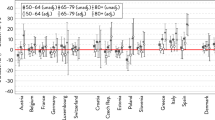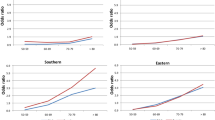Abstract
This study questions the ‘misery perspective’ generally used to understand gender, ageing and health. Using the General Household Survey time-series data, the article explores the changes in self-reported health for men and women aged 65 years and over across cohorts and historical time in the United Kingdom. It is found that although gender difference in reporting poor health existed for those born between 1880 and 1920, the difference was not observed for those born between 1921 and 1940. It is also found that compared to the 1970s and 1980s, gender difference in reporting poor health in old age decreased in the early 1990s and diminished to a negligible level in the 2000s. The results challenge the conventional understanding of comparative disadvantage of older women in the literature and illuminate that historical timing plays a role in the relationship between gender and ageing.
Similar content being viewed by others
References
Alwin, D.F. and McCammon, R.J. (2003) Generations, cohorts and social change. In: J.T. Mortimer and M.J. Shanahan (eds.) Handbook of the Life Course. New York: Kluwer Academic, pp. 23–49.
Arber, S., Andersson, L. and Hoff, A. (2007) Changing approaches to gender and ageing. Current Sociology 55 (2): 147–153.
Arber, S. and Cooper, H. (1999) Gender differences in health in later life: The new paradox? Social Science and Medicine 48 (1): 61–76.
Arber, S. and Ginn, J. (1991) Gender and Later Life: A Sociological Analysis of Resources and Constraints. London: Sage.
Arber, S. and Ginn, J. (1993) Gender and inequalities in health in later life. Social Science and Medicine 36 (1): 33–46.
Arber, S. and Ginn, J. (1995) Connecting Gender and Ageing: A Sociological Approach. Buckingham, UK: Open University Press.
Arnot, M., David, M. and Weiner, G. (1999) Closing the Gender Gap: Postwar Education and Social Change. Cambridge, MA: Polity Press.
Beeson, D. (1975) Women in studies of ageing: A critique and suggestion. Social Problems 23: 52–59.
Blaxter, M. (1990) Health and Lifestyles. London: Routledge.
Chappell, N.L. and Havens, B. (1980) Old and female: Testing the double jeopardy hypothesis. Sociological Quarterly 21: 147–171.
Courtenay, W. (2002) A global perspective on the field of men’s health: An editorial. International Journal of Men′s Health 1 (1): 1–13.
Cumming, E. and Henry, W.E. (1961) Growing Old: The Process of Disengagement. New York: Basic Books.
Dowd, J.J. and Bengtson, V.L. (1978) Aging and minority populations: An examination of the double jeopardy hypothesis. Journal of Gerontology 30: 584–594.
Döring, D., Hauser, R., Rolf, G. and Tibitanzl, F. (1994) Old-age security for women in the twelve EC countries. Journal of European Social Policy 4 (1): 1–18.
Elder, G.H. (1975) Age differentiation and the life course. Annual Review of Sociology 1: 165–190.
Emslie, C., Hunt, K. and O'Brien, R. (2004) Masculinities in older men: A qualitative study in the west of Scotland. The Journal of Men’s Studies 12 (3): 207–226.
Fennell, G. and Davidson, K. (2003) The invisible men? Older men in modern society. Ageing International 28 (4): 315–325.
Fleming, A.A. (1999) Older men in contemporary discourses on ageing: Absent bodies and invisible lives. Nursing Inquiry 6 (1): 3–8.
Glen Jr, H.E., Johnson, M.K. and Crosnoe, R. (2003) The emergence and development of life course theory. In: J.T. Mortimer and M.J. Shanahan (eds.) Handbook of the Life Course. New York: Kluwer Academic, pp. 3–22.
Glenn, N.D. (2003) Distinguishing age, period and cohort effects. In: J.T. Mortimer and M.J. Shanahan (eds.) Handbook of the Life Course. New York: Kluwer Academic, pp. 465–476.
Global Acting on Aging. (2002) Final declaration and recommendations of the world NGO forum on ageing, http://www.globalaging.org/waa2/documents/finaldeclarationandrecommendationsngoforum.doc, accessed 9 May 2009.
Gunnarsson, E. (2002) The vulnerable life course: Poverty and social assistance among middle-aged and older women. Ageing and Society 22: 709–728.
Hearn, J. (1995) Imaging the aging of men. In: M. Featherstone and A. Wernick (eds.) Images of Aging: Cultural Representations of Later Life. London: Routledge, pp. 97–115.
Hungerford, T.L. (2001) The economic consequences of widowhood on elderly women in the United States and Germany. Gerontologist 41: 103–110.
Idler, E.L. and Benyamini, Y. (1997) Self-rated health and mortality: A review of twenty-seven community studies. Journal of Health and Social Behavior 38 (1): 21–37.
Johnson, R.J. and Wolinsky, F.D. (1994) Gender, race and health: The structure of health status among older adults. Gerontologist 34: 24–35.
Kandrack, M., Grant, K.R. and Segall, A. (1991) Gender differences in health related behaviour: Some unanswered questions. Social Science and Medicine 32 (5): 579–590.
Knodel, J. and Ofstedal, M.B. (2003) Gender and ageing in the developing world: Where are the men? Population and Development Review 29 (4): 677–698.
Krekula, C. (2007) The intersection of age and gender: Reworking gender theory and social gerontology. Current Sociology 55 (2): 155–171.
Lahelma, E., Martikainen, P., Rahkonen, O. and Silventoinen, K. (1999) Gender differences in ill health in Finland: Patterns, magnitude and change. Social Science and Medicine 48 (1): 7–19.
Macintyre, S. (1993) Gender differences in the perceptions of common cold symptoms. Social Science and Medicine 36: 15–20.
Macintyre, S., Hunt, K. and Sweeting, H. (1996) Gender differences in health: Are things really as simple as they seem? Social Science and Medicine 42 (4): 617–624.
Marks, N.F. (1996) Socioeconomic status, gender and health at midlife: Evidence from the Wisconsin longitudinal study. Research in the Sociology of Health Care 13: 133–150.
Mcmullin, J. (1995) Theorizing age and gender relations. In: S. Arber and J. Ginn (eds.) Connecting Gender and Ageing: A Sociological Approach. Buckingham, UK: Open University Press, pp. 173–199.
McVittie, C. and Willock, J. (2006) You can’t fight windmills’: How older men do health, ill health, and masculinities. Qualitative Health Research 16 (6): 788–801.
Miilunpalo, S., Vuori, I., Oja, P., Pasanen, M. and Urponen, H. (1997) Self-rated health status as a health measure: The predictive value of self-reported health status on the use of physician services and on mortality in the working-age population. Journal of Clinical Epidemiology 50 (5): 517–528.
Miles, A. (1991) Women, Health and Medicine. Milton Keynes, UK: Open University Press.
Mossey, J.M. and Shapiro, E. (1982) Self-rated health: A predictor of mortality among the elderly. American Journal of Public Health 72 (8): 800–808.
Nathanson, C. (1975) Illness and the feminine role: A theoretical review. Social Science and Medicine 9: 57–62.
Nathanson, C. (1977) Sex, illness and medical care: A review of data, theory and method. Social Science and Medicine 11: 13–25.
Olson, L. (1992) ‘Aging is a Woman's Problem’: Issues faced by the female elderly population. In: J.E. Gubrium and K. Charmaz (eds.) Aging, Self and Community. London: JAI Press, pp. 265–276.
Rahman, O., Strauss, J., Gertler, P., Ashley, D. and Fox, K. (1994) Gender differences in adult health: An international comparison. Gerontologist 34: 463–469.
Russell, C. (1987) Aging as a feminist issue. Women’s Studies International Forum 10: 125–132.
Russell, C. (2007) What do older women and men want: Gender differences in the ‘lived experience’ of ageing. Current Sociology 55 (2): 173–192.
Ryder, N.B. (1965) The cohort as a concept in the study of social change. American Sociological Review 30: 843–861.
Settersten, R.A. (2006) Aging and the life course. In: R.H. Binstock and L.K. George (eds.) Handbook of Aging and the Social Sciences. London: Academic Press, pp. 3–16.
Sontag, S. (1972) The double standard of ageing. Saturday Review of the Society 23: 29–38.
Thompson, E.H. (1994) Older men as invisible men in contemporary society. In: E.H. Thompson (ed.) Older Men’s Lives. Thousand Oaks, CA: Sage, pp. 1–21.
United Nations. (2002) Madrid international plan on ageing, http://www.un.org/esa/socdev/ageing/madrid_intlplanaction.html, accessed 9 May 2009.
Uren, Z. (2006) The GHS Pseudo Cohort Dataset (GHSPCD): Introduction and Methodology. UK: Office for National Statistics.
Verbrugge, L. (1979) Females and illness: Recent trends in sex differences in the United States. Journal of Health and Social Behaviour 17: 387–403.
Waldron, I. (1983) Sex differences in illness incidence, prognosis and mortality: Issues and evidence. Social Science and Medicine 17 (16): 1107–1123.
Author information
Authors and Affiliations
Rights and permissions
About this article
Cite this article
Suen, Y. Do older women or older men report worse health? Questioning the ‘sicker’ older women assumption through a period and cohort analysis. Soc Theory Health 9, 71–86 (2011). https://doi.org/10.1057/sth.2010.6
Published:
Issue Date:
DOI: https://doi.org/10.1057/sth.2010.6




